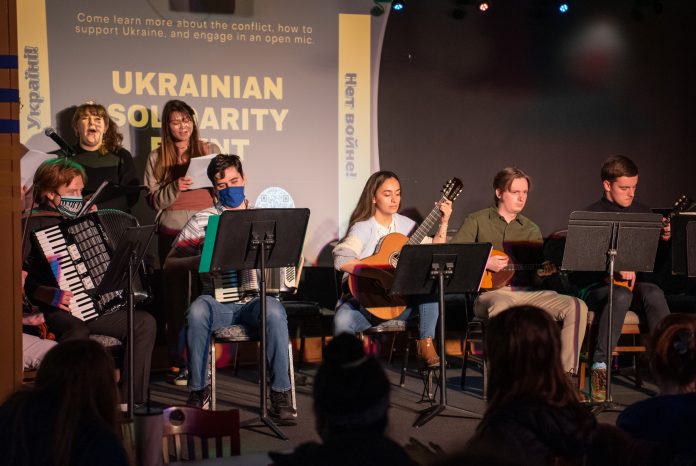Thursday, March 3, students gathered in Sadler’s Lodge One to show solidarity for Ukraine amidst the recent Russian invasions. Through musical performances, prayers and personal stories, members of the community expressed collective unity and sorrow concerning the attacks.
Representatives from Student Assembly, Rainbow Coalition and the Russian House organized this event to bring attention to the human aspect of the conflict in Ukraine and provide resources to act.
Co-President of the Russian House Kathryn Webb ’23 opened the floor and introduced the foundational beliefs of the organizations involved in the event.
“We wanted to clarify that, even though I think it’s pretty clear, we do condemn the violence in Ukraine,” Webb said. “And we wanted to also state that this is an anti-Putin event. This is not an anti-Russian event.”
Speakers like Aubrey Lay ’23, organizer and Rainbow Coalition activism chair, recognized how the College of William and Mary’s response to the war has been largely intellectual and has failed to address the depth of suffering within the community and beyond.
“We felt like there wasn’t much of a voice being given to the students who are most directly affected by this, so we wanted to hold space for that,” Lay said.
The event began with a performance by the Russian Music Ensemble. Playing cheerful folk songs from Belarus, Russia and Ukraine, the show was a celebration of the joy that exists in Eastern European cultures.
Following the musical performance, there was a two-minute moment of silence before community members took turns speaking about what the conflict means to them.
Russian studies professors Alexander Prokhorov and Elena Prokhorova condemned Vladmir Putin’s violent actions in Ukraine and his intentional spreading of lies about the Ukrainian government.
“As of today, there are 1 million refugees and many more are hiding in buildings, in cellars, in the subway,” Prokhorova said. “To justify the war, Russian propaganda calls for the ‘denazification’ of Ukraine.”
Prokhorova elaborated on the danger of the situation in Ukraine, especially in regards to the intentional spread of misinformation through outlets which share propaganda.
“It is a war on historical memory,” Prokhorova said. “It muddles up and dilutes the very meaning of Nazi crimes and Nazi ideologies. It is used to dehumanize people who Putin and his minions consider the enemy. And make no mistake, it is not just a war on Ukraine. It is a war on democracy, and it should concern all.”
Prokhorov shed light on the experiences of his friends in Ukraine and explained the importance of recognizing the pattern of misogyny in Putin’s aggression.
“Before Putin unleashed the war, he made a joke, a rape joke, on Russian television. He said, ‘Like it or not Ukraine, it is your duty, my beauty.’ And I think the meaning reveals how much patriarchy is ingrained in this particular aggression,” Prokhorov said.
Following the professors’ speeches, Ezzie Seigel ’23 spoke about their family’s escape from Ukraine during the rule of the Russian Empire. They reflected on the hypocrisy of Putin claiming to “denazify” a country with a democratically elected Jewish president. For Seigel, Jewish families are all too familiar with violence and will never forget their oppressed histories.
“I think it’s very hard for people in America, since we haven’t had a war fought on our soil since the American Civil War, for people whose families don’t come from a background where they had to experience violence, to connect emotionally to very big things that are happening in other places in the world,” Seigel said.
Seigel was then joined by a representative from Hillel International in a Hebrew prayer for healing. Throughout the evening, multiple students with various religious backgrounds, including Catholic and Orthodox Christian, shared prayers with the group.
While not Ukrainian himself, Bennett Meale ’24 told stories from his time living in Ukraine during the 2014 Maidan Revolution. Recounting acts of solidarity and perseverance he used to witness every day, Meale expressed confidence in the strength of the Ukrainian people.
“Over time, it was clear that despite everything, the spirit of the people was completely indomitable. And that’s always been the case with Ukraine. It’s been part of Russia, certain parts have been part of Poland, part of Austria Hungary, but they’ve continued to rise up again and again and anytime they can, they always seize their independence,” Meale said.
He also reflected on how this tenacity is best represented in the country’s national anthem, which roughly translates to “the glory and freedom of Ukraine has not yet perished.”
After the scheduled speakers finished, the floor was opened to members of the audience who were inspired to speak and share their own experiences. Each personal story that reflected on family, friends and acquaintances still stuck in Ukraine was a reminder of the reality of the human pain attributed to this conflict.
For many who were involved, that was the overarching goal of the event: to fully reflect on the humanitarian effects of the war and to actively provide support to those who are suffering from it.
“As a school, if we claim to be internationally minded, we need to do that holistically. We can’t just engage intellectually with these issues, we also have to engage on a human level,” Lay said.
Still, the speakers stressed that simply showing up for this event is not enough. They urged audience members to make donations, support refugee resettlement efforts, and counter misinformation.
“I’d like you to think about why you’re here and what you’re going to do about it, because being here is a great thing, but we need to take being here and make something concrete from it,” Webb said.
For guidance, organizers provided a list of places to donate and more resources at their linktree: https://linktr.ee/wmstudentsforukraine.

